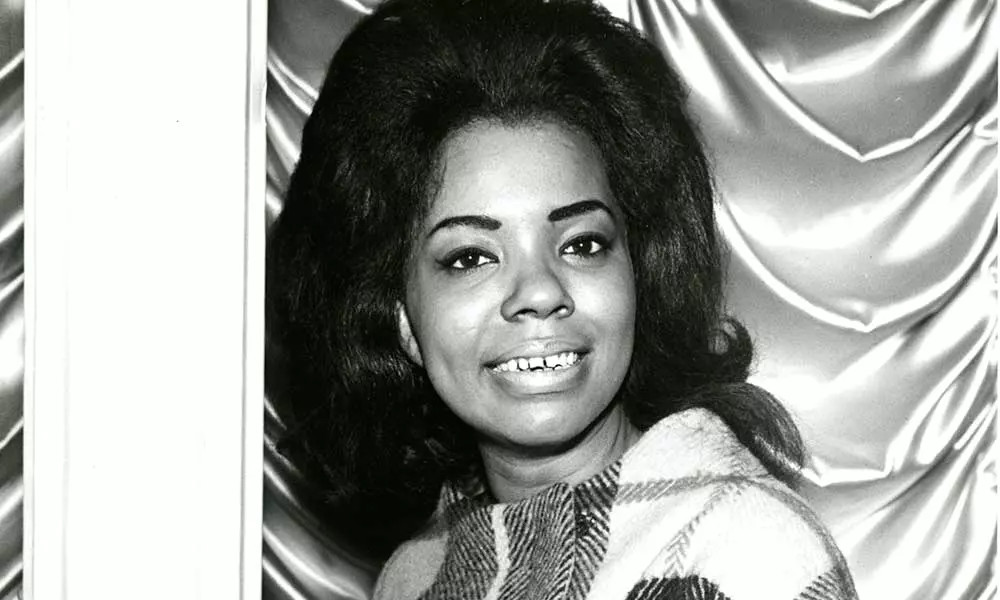In a landmark week coinciding with her 21st birthday, Mary Wells, a shining star in Motown’s early constellation, achieved a pinnacle of success. Her signature song, “My Guy,” ascended to the No. 1 spot on the Billboard Hot 100 chart, solidifying her place in music history. While Mary Wells boasts a repertoire of hits including “You Beat Me To The Punch,” “Two Lovers,” and “The One Who Really Loves You,” it is “My Guy” that remains her most iconic and defining masterpiece. This track not only topped charts but also encapsulated the vibrant energy of early Motown and showcased Wells’ distinctive vocal talent to a global audience.
 Mary Wells, the Queen of Motown, in a classic portrait from the Motown/EMI Hayes Archives, highlighting her early career.
Mary Wells, the Queen of Motown, in a classic portrait from the Motown/EMI Hayes Archives, highlighting her early career.
Despite her pivotal role in the Tamla label’s initial triumphs, Mary Wells’ contributions are sometimes overshadowed. This can be partly attributed to her decision to leave Motown in 1964 for 20th Century Fox, a move that, in retrospect, was not career-enhancing. Tragically, her life was cut short by cancer in 1992 at the young age of 49, further contributing to a sense of her legacy being somewhat underappreciated in mainstream narratives.
Loucye Gordy Wakefield, Motown’s first sales chief and sister to Berry Gordy, poignantly remarked to the New York Times upon Wells’ passing, “In 1964, Mary Wells was our big, big artist. I don’t think there’s any audience with an age of 30 through 50 that doesn’t know the words to ‘My Guy.’” This testament underscores the indelible mark “My Guy” left on popular culture and the deep connection it forged with listeners across generations.
The Magic Behind “My Guy”: A Smokey Robinson Creation
The genius behind “My Guy” is none other than Smokey Robinson, a Motown legend himself, who both penned and produced this timeless classic. Released in 1964, the song’s infectious melody and heartfelt lyrics resonated instantly, propelling it to the top of the charts. On the Billboard Hot 100 chart dated May 16, 1964, “My Guy” dethroned Louis Armstrong’s “Hello, Dolly!”, taking the coveted No. 1 position. Its two-week reign at the summit was eventually succeeded by The Beatles’ “Love Me Do,” placing “My Guy” in the esteemed company of music titans.
The irony is rich, considering Mary Wells was not only a favorite Motown artist of The Beatles but also toured with them in the UK later in 1964. This intersection of musical worlds highlights the widespread appeal of “My Guy” and Mary Wells’ influence extending beyond American shores to captivate even the British Invasion icons.
Mary Wells: More Than Just “My Guy”
The success of “My Guy” amplified Mary Wells’ already rising star within Motown. In fact, during its chart ascent, she was simultaneously collaborating with Marvin Gaye on their album Together. Interestingly, it was not Gaye’s established fame that Motown sought to leverage, but rather Wells’ burgeoning stardom that they believed would elevate Gaye’s profile – a testament to her immense popularity at the time.
While “My Guy” should have paved the way for even greater achievements for Mary Wells at Motown, it unfortunately became her last solo single to reach the top echelons of the charts under the label. Her duets with Marvin Gaye did yield successful singles like “Once Upon A Time” and “What’s The Matter With You Baby,” yet her 21st birthday marked a turning point. It presented her with an opportunity to depart from her Motown contract, an option she pursued, perhaps unwisely in hindsight.
Although her subsequent career trajectory did not replicate the monumental success she enjoyed at Motown, Mary Wells remains cherished by Motown aficionados as the “First Queen of Motown.” “My Guy” endures as a testament to her vocal prowess, Smokey Robinson’s songwriting brilliance, and the golden era of Motown, forever etching her name in the annals of music history.
You can experience the magic of “My Guy” and explore more of Mary Wells’ incredible discography on The Definitive Collection. Discover why this song continues to resonate and why Mary Wells remains a foundational figure in soul music.
